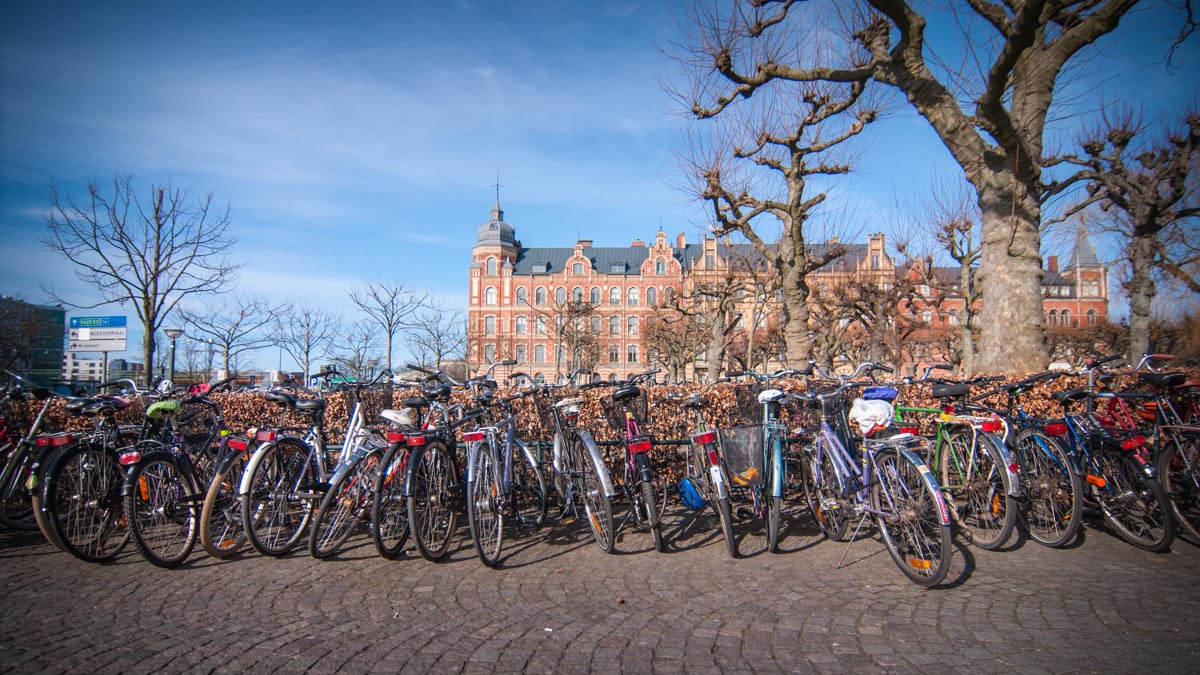Students have made Lund, Sweden’s most bicycle concentrated city. Innovative bicycle based solutions can probably make Lund a global cycling destination.
A city’s urban fabric includes a strong transportation infrastructure. As for Lund, this means, maintaining its position as Sweden’s top bicycle active city. Since 2011, Lund city has been participating in the Bicycle Association’s report, which, alongside the Swedish organisation’s objective is targeted at promoting bicycle activity. In 2014, this report, measuring through a point based system, included an evaluation of 34 Swedish municipalities and Lund municipality, for the second time, ranked number 1.
With a population of 114,300, the modal share for bicycle riders in Lund is in between 30-45 per cent. Lund provides approximately 2.4 meters of bicycle path per capita and over 5000 bicycle parking spaces. Investments towards biking infrastructure and its maintenance per inhabitant in Lund amount to SEK 448, well above the national average of SEK 250.
It is very evident that Lund is a bicycle friendly city and such a characteristic has been created through the presence of over a 47 000 strong student population. Though, there is room for improvement.
In summer last year, Lundahoj, a bicycle sharing company, launched 17 bicycle terminals between 250 bicycles across Lund. While the business is active, these ‘orange-heart’ trademarked bicycles are not seen very prominently across Lund’s second hand bicycle fleet.
The market for lemons or second hand market for bicycles is a case where students need to be careful. There are bicycle dealers in Lund who sell bicycles at a very low price. They will not inform students about the defects of the bicycle and this can be as serious as the bike being confiscated by Lund police. While students constantly buy and sell student essential products online there should be a page dedicated to the purchase and sale of bicycles. Creating such a page is very easy and will minimise the entry of new faulty bicycles into the pre-existing strong market for second hand bicycles.
Considering bicycle numbers, Lund municipality should reconsider the ratio between bicycles and secure bicycle parking spots. There is always demand for bicycles and unless adequate number of parking stations are provided, entrepreneurs might have to think of innovative solutions towards curbing bicycle theft. One such example is Seatylock, where the seat of the bicycle works as a lock.
Ilan Mor, co-founder of Seatylock explains, “Like any urban cyclists we were always disturbed by the fact that theft has been on the rise for many years. We have seen cyclists dragging around their heavy locks while riding, and in many cases taking their seat post and saddle with them after locking their bike. We were disturbed by bicycle security and all the inconvenience that comes along with it”.
There is one more area for improvement.
Students using bicycles in Lund are not always seen wearing a helmet while riding their bicycle. Interestingly, there is a solution for bicycle rider safety created by former students of the Industrial Design programme at Lund University. Anna Haupt and Terese Alstin, created Hövding, Airbag for Cyclists. They have created an air bag which releases through the helmet on the uneventful occasion of an accident. The spread of such helmets at an affordable price will benefit all bicycle riders.
These investment initiatives build towards a hat-trick opportunity to win the Bicycle Association’s ranking in 2015. While there is further scope for improvement, if such initiatives are successfully implemented, they will complement LundaMats very well, a long term strategy for transport and mobility in Lund.






